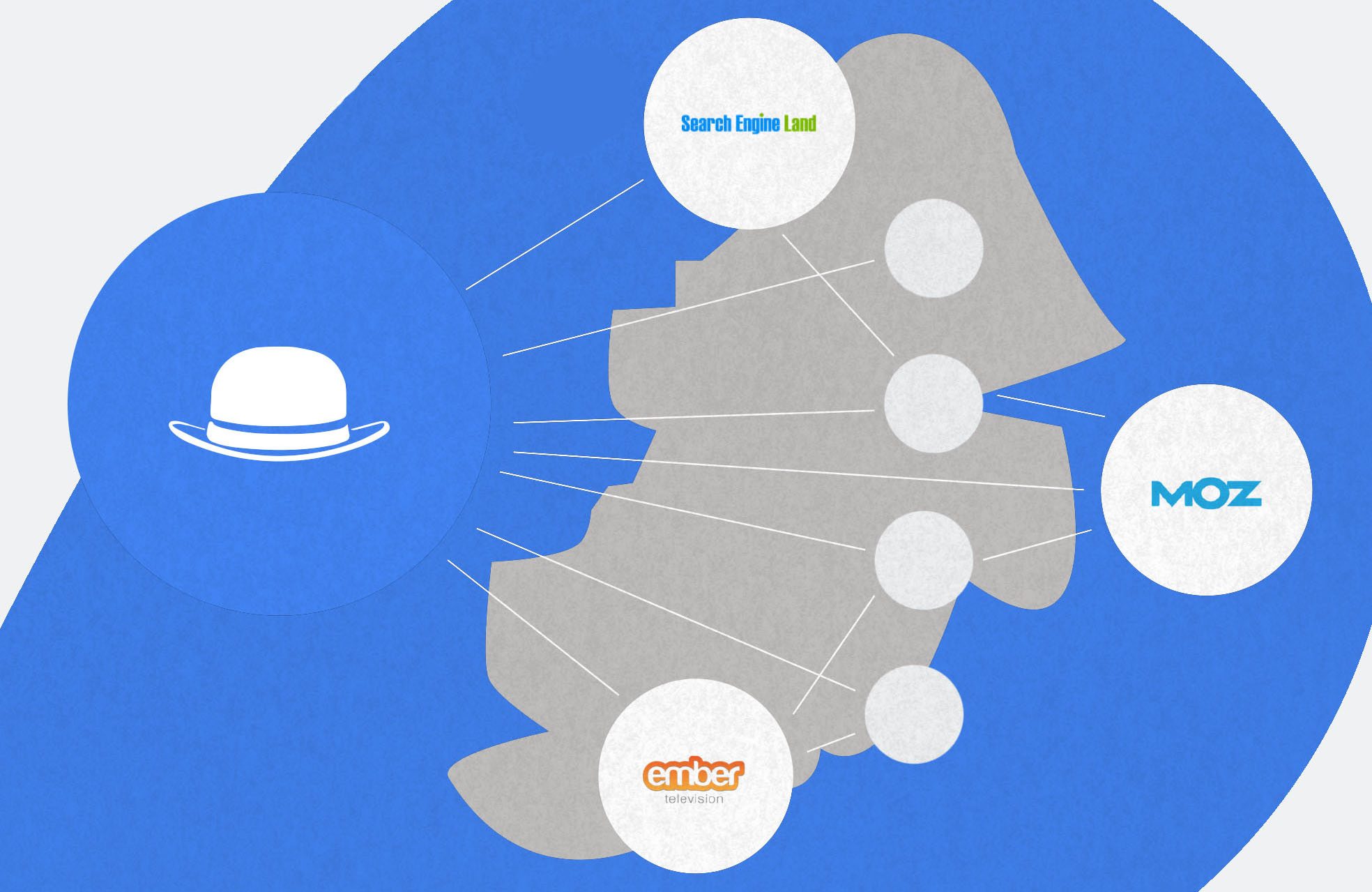Building links for SEO but not seeing results? You are not alone.
In this post, first written in 2016 but now updated for 2022, I try to answer the question of why most link building does nothing to help improve your SEO results.
I also outline how you can do the kind of authority building that will help move the needle on your rankings and organic traffic.
The SEO Industry is bonkers
After well over twenty years in this search engine optimisation business, I can quite honestly say that this industry is crazy.
Despite Google’s best efforts, street-level SEO is still such a backwater industry, that I often find myself ashamed to call myself an SEO.
It’s little wonder that SEOMoz dropped the SEO and now just go by Moz.com. In the eyes of many, we are effectively the used car salesman of marketing. And that sucks.
Why is this the case? Search engines are one of the most amazing and wonderful additions to our modern world. We only have to go back 20 years or so, and getting answers to questions required a trip to the library and hours spent poring over books and microfiche archives. Now, we can just Google it.
Think about it. Anything you want to know. You can just Google it. That is completely amazing. Even we old un’s take the Internet and search engines for granted now, yet Search is likely to go down as one of humankind’s greatest achievements.
Google’s mission statement helps frame this:
“to organise the world’s information and make it universally accessible and useful.”
What a great and noble purpose. Who would not want to be involved in that? And from a marketing perspective, how amazing to have been involved from the early days. I should wear my SEO badge proudly – right?
Most SEO companies have a different mission to Google
Most companies exist with the primary goal of making money.
They are not driven by a set of values, and they certainly don’t strive to create an exceptional customer experience and help people find the best information out there.
Unfortunately, many SEO companies are built on a foundation of greed over morals.
Most SEO companies exist to make money
Now, I am not so naive to see that Google makes money. Lots of it in fact. But they do this through this amazing platform that they have built. I would rather have a search engine with adverts than no search engine at all. I suspect that most people feel the same. Google shows adverts – we get access to the world’s information for free. No complaints from me there.
However, with the ubiquity of search and the spread of smartphones, we now live in an always-on environment. If I want to find a plumber, a new bike, a new house, or even a new spouse (which I don’t – quite happy there), I will likely start with a Google search. Most likely that search will take place on my mobile phone.
So, it naturally follows that businesses want to be found in search engine results. So, they turn to the experts – the self-proclaimed SEO consultants and companies who can help raise their business to the top of the page.
The problem is that Google wants to show the best and most relevant results first. Businesses often want to grab a larger slice of that digital pie than they really deserve. They want to swim upstream and make the search engines bend to their will. Google wants to return quality and relevance. Companies want to own that digital page space. Battle ensues.
Get to the top of Google
There is, of course, a never-ending stream of SEO companies that will offer to “get you to the top of Google”, but just how do they do this? How do they influence the search engine to show your site before that of another potentially closer, bigger or longer-established business?
More importantly – do they work in a way that Google is happy with, and that will return long term results?
Also, are they transparent? What does the average SEO company actually do?
How search engines work
To understand what most SEO companies do to help ‘get you to the top of Google’, we must first understand how search engines work, and in particular, how Google works.
This is a view from 10,000,000 feet:
How does a search engine determine what piece of content should rank first?
This is a low resolution model but these are some of the key factors that Google uses to help rank a site.
1. Relevancy – does your site provide a good result for the question asked? If I search for ‘carpenter Birmingham’, then I am looking for a local carpenter and that is what I want to see.
2. Authority – there are of course going to be many results for a given query, so authority/popularity is used to help order the results.
3. Quality – Google wants to show the best result so a foundational part of any SEO strategy is to be the best result
These three key factors (with many nuances) provide the core basis of how the search engine works.
The relevance and quality of the content are assessed, and then the popularity is determined by how many other authoritative sites link to that piece of content.
Page Rank – the game changer
When I started my SEO career there were a bunch of search engines: Yahoo, Alta Vista, HotBot, Excite, Ask Jeeves etc.
Sadly, the majority of these are not around any longer in 2022.
Why? Because Google developed the PageRank algorithm. PageRank, named in part after Google co-founder Larry Page, looks at the number and quality of links that point to a given site, and individual pages on a given site, to determine how authoritative and popular that site is.
Google uses PageRank to assign a numerical weighting to a given document in a set. Other factors, such as the quality of the content, the authority and relevance of the hosting site, and even the author, can affect the end result.
The following diagram provides an overview of how PageRank is applied in a given set, with the relevant authority shown by the size and number of links:

PageRank takes the idea from an academic citation, in which a paper cited by many other trusted (and well-cited) papers is likely to be of high quality. Although relatively simple, it was this well-executed idea that thrust Google into the big time, and crushed the competition.
The reality is that Google was better. The results were better. So more and more people flocked to Google.
In the wild west of the internet, the best search engine won and there is no credible competition today.
I am not going to go into great detail here, but there is a great Wikipedia entry that I strongly recommend you read, which will give you a good overview of the history: https://en.wikipedia.org/wiki/PageRank
The SEO Agency Business Model
So, with PageRank using links to determine where a site ranks, it naturally follows that in order to improve a site’s visibility, it needs to be of high quality and relevance. It then needs to get more links – and this is where the problems start.
Most SEO companies work across many fields. They don’t have content experts. They don’t focus on making the site the best it can be.
They focus on one thing – links.
In the early days, this worked well, too well even.
The sites that had the most links ranked really well – and there were lots of spammy ways to build links.
SEO companies cottoned on to this, and more and more sites sprang up purely for the purpose of hosting outbound links to help sites rank.
This should not have worked so well, but unfortunately, it did, and often the easiest and most cost-effective way to compete was to just churn out hundreds of crappy links, and there was always an SEO company willing to do so.
The problem was that this was always against Google’s webmaster guidelines. Occasionally, sites would get hit by a manual penalty, but the web is a big place, and policing this at scale can’t be easy. It must, therefore, be done by the search algorithm itself.
The SEO police
In 2011 Google started releasing major qualitative components to the algorithm. Panda came first and tackled the quality of the sites and the written content contained on sites. This was swiftly followed by Penguin, which tackled the quality of links on the site.
Many businesses simply plummeted from view. In many cases, several years of effective but wholly dodgy links fell away. Penguin had a punitive element, in which overt targeting of specific phrases led to penalties for those terms. Penguin iterated and improved, and many sites are still seeing problems today.
We have worked with 100s of businesses over the years who got hurt by Penguin, or really, by the rule-bending of their agency.
Cops & Robbers
The problem is that as soon as one way of artificially ranking a site is squashed, another one comes along. As the spam directory and article sites were crushed by Penguin and Panda, they were swiftly replaced by private blog network (PBN) sites. These are often sites that have some authority but have expired – they are then registered and have a very simple blog or page added. This content then links to the site being promoted. These sites are created purely for the purpose of taking the authority of the previous site and passing that along as a vote to the client’s site.
This approach is popular with SEO firms as it’s just so easy. Find an expired domain with some relevance and authority, spin up one page templated site, add some $5 content, and drop a link in there. BOOM. The job was done. Time to get back on the phone and drum up some more SEO business
(top tip: never trust an Internet marketing company that does aggressive outbound marketing)
Site owners are also not entirely blame-free. Money talks and strong search results for commercial phrases have made a lot of folks a truckload of money. Who cares if it’s not guideline compliant? Also, if you had the choice between paying £250 PM for the quick and easy approach, or £2500 PM for a slow and steady approach, then folks will often go with the cheap and nasty option – money talks and sustainable SEO runs a marathon.
There is a big grey area here as well. If an SEO company sells you this kind of dodgy approach as being totally Google safe, whitehat, guideline compliant (etc yada yada) but is knowingly breaking the rules, then that is not cool. Likewise, Google does not own the Internet, and if you want to try and sculpt the results in your favour for fun and profit, and you do it with your eyes open, then have at it.
Nothing changes
Even in 2022, many SEO companies are still doing things the cheap and nasty way.
They are putting their customers at risk whilst selling them a story about guideline compliance.
This creates a seemingly never-ending game of cops and robbers, with Google policing their results from sites that have artificially improved their position, and the SEO companies switching to the latest daft, short-term tactic to artificially improve results.
The nature of SEO as a bolt-on for web design has led to lots of agencies selling SEO that really don’t get it.
It’s often willful ignorance rather than malevolence – but the end result is the same.
Ass Backwards SEO
This gives us something we like to call Ass Backwards SEO (or Ass Backwards Link Building).
SEO is built upon value
Consider PageRank and the core idea here and distil it down:
- Something of value is cited (linked to) by other well-cited documents.
- Something of value is linked to.
- Something of value
This is where most outsourced SEO goes wrong. Or, gets it ass-backwards! They don’t create the initial value.
The starting point is not something that other authoritative and high-quality sites would link to.
So, without anything to really link to, they are forced to create sites or generate links from backwater websites with no authority.
Any big and credible source will not just link to your local plumbing business – why would they? But if you published a complete guide to plumbing jobs you can do yourself and promoted that in the right way, you may well get some play (and a boatload of links).
So the SEO companies create sites and try to play the system. They use cheap parlour tricks to rank your business, whilst playing against the biggest and best brains in the world that Google employs, as they try to make the world’s information useful and accessible.
This is completely backwards – if you don’t start with the value – and then they try to fake the links.
You are building a house of cards and when it falls away, you are left with nothing.
Your SEO Philosophy should be about reciprocity and value.
Google’s business model
A useful example of this is to look at Google’s own business model.
Google created a search engine to provide this wondrous access to information. It is free. And utterly amazing. My children of 18, 16 and 10 have never known the world without Search.
They use it for school, for entertainment, for homework. How much more do our children know, and how much more information do they have easy access to than we had? How will this change the world over the coming generations? How much cleverer will we be? It’s an exciting time.
Google is a wonderful resource.
In return, they get to show us adverts. Give and take. Reciprocity. Value leads to results. This is the way that things should be done.
Likewise, consider Wikipedia. A free, online Encyclopaedia. Plenty of value there. And guess what – Wikipedia has plenty of links. Quite literally billions of them. This is shown by this screenshot from the popular SEO link analysis tool Majestic.

The basic principle here is that to get links that Google likes, you need to create something of value. It is wrong to assume that links will just tumble in, though, and you have to then promote the hell out of what you have just created.
Build it and they will come
Smart thinking here is to find something that has been built previously, has lots of links, and that you could do better. Create the new and improved version, and let all the folks that linked to the previous version know about it. Tell the world. Share it via social media, and try to get influential folks to share it with their audience.
It is not to say this is easy – it is part art and part science. But it works, it is safe, sustainable, won’t upset Google, and can be scaled. In practical terms, for most small businesses a single piece of epic content with a solid outreach campaign can make all the difference.
Most importantly of all, you are starting with value. You are playing by the rules. You won’t get penalised and see a sudden loss of traffic.
This is not a field of dreams and you will still likely have to promote your wonderful resource – but start with value and the rest gets way easier.
2022 – Links still matter
Search has evolved considerably over the last twenty years. However, links still matter.
If your link building is not working you must ask yourself – did you start with something valuable that deserves to be linked to?
If not, if your SEO company is just building strange links that just smell a bit off… then chances are you are wasting your time and money.
Even if you rank well at the moment, you have to be thinking about tomorrow, you have to be focused on value.
Do your links pass the smell test?
If you would like some help understanding your link profile or the links built for you by your current SEO company, we will happily give you a confidential second opinion – get in touch.
References
Google’s Webmaster Guidelines – https://support.google.com/webmasters/answer/35769?hl=en
Wikipedia PageRank – https://en.wikipedia.org/wiki/Main_Page
Google Panda – https://en.wikipedia.org/wiki/Google_Panda
Google Penguin – https://en.wikipedia.org/wiki/Google_Penguin







6 Responses
Great article. These people give real marketers a bad name. I can’t tell you how many clients we’ve dealt with that had used these churn and burn ‘agencies’, charged $1k+/mo and all they did was the Fiverr spam links and automate some low quality social content.
Great business model for the morally corrupt! Much tougher for those of us that actually feel an ethical responsibility in how we promote our clients! 🙂
Thanks for another great article that I can safely show my clients how the web is supposed to work and generally does. It also lets them know that I am not full of BS when I tell them that fresh, informative content will pay off big time and no company can promise you page 1 on Google period, but to do it without cheating with every client they have is virtually impossible they believe me. Thanks again, Marcus
Hey Shawn – glad you enjoyed. Cheers. 🙂
Great article Marcus. This content helps for new comer SEOs.
Thanks.
thank you for sharing this useful information, this really helps. this is like reading an entire book and I can utilise this entire knowledge into my personal growth.